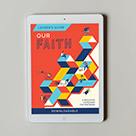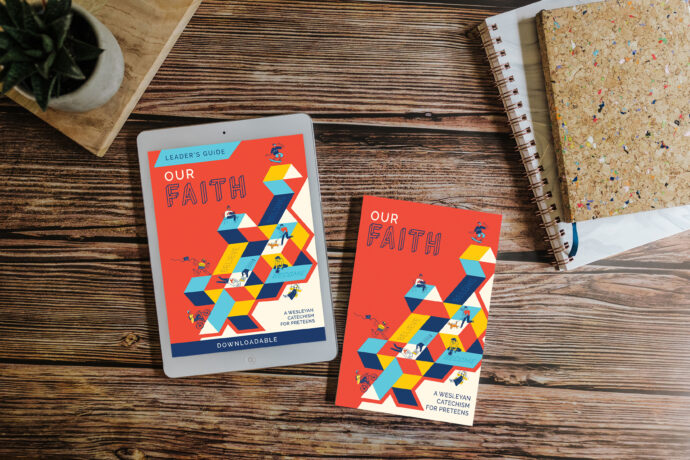In a theater class in junior high, I had to learn a Shakespearean monologue and perform it for my peers. I was assigned the famous “All the world’s a stage” speech from As You Like It. I took the play home, memorized the lines, and prepared to wow the other thirteen-year-olds with my thespian chops. I practiced in front of a mirror with a British accent that would put Dick Van Dyke (the greatest British accent of all time, obviously) to shame.
On the day of my monologue I was feeling pretty confident. I had my lines locked in and was ready to bring my best sixteenth-century game.
I learned something important that day: I could say all the words to my monologue, but I had absolutely no idea what I was talking about. I learned what I was supposed to learn. I memorized it . . . but I didn’t know it.
When The Foundry Publishing reached out to me about working on a new catechism project, I thought about my run-in with Shakespeare in seventh grade. I thought about memorizing lines without having any idea what those words were trying to say. Catechism in the church has traditionally been a summary of rote recitation. We work to memorize the answers to dozens of questions about our faith so we are adequately equipped to talk about Christianity. For some, this method has been an excellent practice of learning what we believe. But do all our kids truly understand what they’re memorizing?
Once we assembled our team for this project, we started with the basic building blocks of traditional catechism, but our conversations about what we believe led to other questions:
Where do we belong?
How do we, here in the twenty-first century, fit into the overall story of Christianity?
What’s our role in this narrative?
What could some heroes of the Christian faith teach us about living this story?
Those questions opened up other questions:
How do we become what we believe?
How do we move from just memorizing facts about our faith to living out the truth of our faith in everyday life?
How could we create a truly Wesleyan catechism if it didn’t lead to transformation?
- Robert Mulholland, Jr. reminds us that “knowing God . . . is not simply a matter of cognitive knowledge; it necessarily involves experiential or transformational knowledge. Wesley’s focus is on a vital love relationship with God, not upon propositional knowledge about God” (quoted in Al Truesdale’s Square Peg, 31).
In catechism, we learn what we believe. But are we also learning how to belong to that story? Are we learning how to become more like Jesus?
Belong, believe, become became our framework. Each week of the series, we took our central focus and created a curriculum that would help kids find their place in the story (belong), learn some core truths about our faith (believe), and put some spiritually formative practices into place in order to live into those truths (become). Discipleship is so much more than just believing!
With this foundation, we built an eight-week catechism that introduces the story of Jesus, what it means to be a Christian, and what it means to accept and live in God’s love. We emphasized the authority of Scripture, other sources that help shape our faith, and the way God is still at work in the world. The Our Faith children’s catechism still asks questions and helps kids learn answers each week, but instead of rote memorization, Our Faith offers more holistic explorations that help children understand not only what we believe but also how we belong in the church and become more like Jesus.
We want them to be able to articulate their Christianity—not only with their words but also with their actions, out of a deep love for their Creator and a confidence in the love from their Creator.
I memorized that Shakespeare monologue all those years ago, but I still have no idea what As You Like It is about. We didn’t want that to be true about kids learning the faith. We want them to be able to articulate their Christianity—not only with their words but also with their actions, out of a deep love for their Creator and a confidence in the love from their Creator.
We called the catechism Our Faith because we want kids to understand that it belongs to them just as much as they belong to it. It can be used as a standalone product, or it also pairs well with the four-week Our Church membership curriculum for kids.
 Our Faith Leader’s Guide and student book packs are available on TheFoundryPublishing.com
Our Faith Leader’s Guide and student book packs are available on TheFoundryPublishing.com





0 Comments